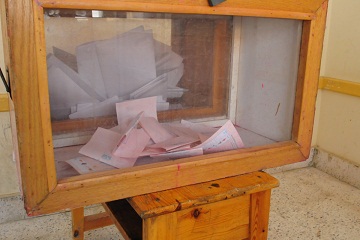Associated Press
CAIRO: Egypt s best-known democracy movement has switched its cause, now focused on demanding an end to the country s peace treaty with Israel.
The campaign by the moderate Kefaya group is a sign of how the war in Lebanon knocked momentum from democracy efforts and left many reform activists deeply resentful of the United States.
Over the past two years, Washington said promoting democracy is a key part of its Middle East policy. But now reformists whom the United States encouraged blame Washington for supporting Israel in its offensive aimed at Hezbollah militants, which wreaked widespread destruction in Lebanon.
I was among those who saw hope in an American role to bring democratic change, said Nigad Borai, a rights activist whose organization, the Group for Democratic Development, benefited from a U.S. program offering financial assistance to civil society groups.
Now, I am convinced that a nation that tolerates Israeli war crimes and provides diplomatic coverage for them cannot be genuinely democratic, he said.
Edward S. Walker, a former U.S. ambassador to Egypt and Israel, believes Kefaya s new campaign showcases Washington s dilemma as it strives to sell the values of democracy and freedom in a region galvanized for decades by the Arab-Israeli conflict.
One of the costs of pressing for democracy in the Middle East is the fact that most democratically based Arab parties … will be hostile to Israel, said Walker, now with the Middle East Institute, a Washington-based think-tank.
The Kefaya movement has launched a campaign to collect 1 million signatures on a petition calling for the annulment of Egypt s U.S.-sponsored 1979 peace treaty with Israel.
The move is mainly symbolic, but it highlights the extent of resentment felt by Egyptians toward Israel – and by association, the United States, its main backer.
The Lebanon war is responsible, said Kefaya spokesman and founding member George Ishaq. The petition is a reaction in part to the [Egyptian government’s] feeble diplomatic handling of the war. He said 100,000 signatures have been collected so far.
The Egyptian-Israeli treaty ended hostilities between the two neighbors, four wars between 1948 and 1973, and is cited by successive American administrations as a model for peaceful coexistence in the region. But it failed to dent the animosity most Egyptians feel for Israel.
The anti-Israel campaign is a major shift in agenda for Kefaya, whose name is Arabic for Enough! , as in enough of the 25-year rule of President Hosni Mubarak.
The movement, made up of politicians, intellectuals and rights activists, burst onto Egypt s political scene two years ago, holding noisy demonstrations aimed at stopping Mubarak from seeking a fifth, six-year term in office or allowing his son, Gamal, to succeed him.
At least for a time, Kefaya s actions captured Washington s attention as a movement with the potential to peacefully bring reform. U.S. Secretary of State Condoleezza Rice met with Kefaya and other reform activists during a visit to Cairo last year.
The movement succeeded in breaking down deeply ingrained political taboos, particularly by calling openly for Mubarak to step down. Its colorful street protests stirred up Egypt s stagnant politics and made democratic reform a top issue.
Still, Kefaya failed in its immediate political goals; the 78-year-old Mubarak was re-elected a year ago. Many believe his son is still on course to succeed him, consolidating his grip on the country s ruling party and the Cabinet with a group of loyal, pro-Western ministers.
Many Egyptians strongly oppose an accession to power by Gamal Mubarak, seeing it as a mere continuation of his father s rule, even though he touts himself as a reformer.
U.S. President George W. Bush implicitly gave his stamp of approval to the younger Mubarak in a recent interview, praising young reformers in Egypt. Bush did not mention Kefaya or other opposition groups, but instead pointed to Gamal Mubarak allies in the government.
In the long run, the United States is going to have to make a decision as to whether or not it will support moderates against extremists, reformers against tyrants, Bush told The Wall Street Journal in an interview published Saturday.
Now Kefaya is more concerned with Israel. On its Web site, dozens of postings expound on the pros and cons of abolishing Egypt s peace treaty.
Some wrote that piece with Israel was an illusion, a danger to Egyptian national security, or that it was time for Egyptians to struggle against Israel.
The most prominent casualty of Washington s policy during the Lebanon was its program for democracy in the Middle East, said Amr Hamzawi, a Middle East expert at Carnegie Endowments, a Washington-based think tank. When an elected government in Lebanon faced a challenge, the American administration blatantly took the side of Israel. Tens of thousands across the Arab world protested Israel s Lebanon offensive, focusing their anger on Washington because it rejected calls for a cease-fire early in the Lebanon fighting. The United States argued that a quick truce would not last without new political realities on the ground, but many Arabs saw that as just a green light for Israel to press on with its campaign.
The Americans handling of the Lebanon war has undermined an already diminishing U.S. credibility in the Arab world, said London-based Middle East expert Rosemary Hollis. It has chipped away a big chunk of it.

